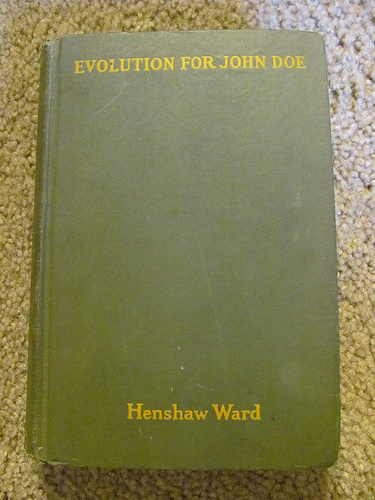
Over the Labor Day weekend, I was visiting a used bookstore in Jackson, California, which happened to be having a sale. The sale induced me to buy a copy of Henshaw Ward’s popular exposition of evolution Evolution for John Doe (1925). John Doe, of course, is a common placeholder name in legal documents in the United States: Ward might have aimed his book at Joe Bloggs or John Q. Public or Joe Sixpack. But who was Henshaw Ward? According to the brief obituary in The New York Times for October 9, 1935, Charles Henshaw Ward was born in Norfolk, Nebraska, in 1872. After attending Pomona College and Yale University, where he earned a master’s degree in 1899, Ward taught English in the Thacher School in Ojai, California, and then at the Taft School in Watertown, Connecticut, from 1903 to 1922. He taught at the University of California, Berkeley after leaving the Taft School, according to the obituary; it’s not clear to me in what capacity, although I found evidence that he was teaching a summer session class to English teachers in 1924. He died in 1935.
In keeping with his profession, Ward published a number of books on English composition and edited a 1916 edition of George Eliot’s The Mill on the Floss and a 1919 edition of Edmund Burke’s speech on conciliation with America. In the 1920s, though, he also ventured into popular science, editing Exploring Nature (1923) and writing Evolution for John Doe (1925), later reissued under the less interesting title Evolution for Everybody (1925); Exploring the Universe (1927); and Charles Darwin: The Man and His Warfare (1927), later reissued under the less combative title Charles Darwin and the Theory of Evolution (1943). He also offered two pleas for critical thinking: Thobbing (1926) and Builders of Delusion (1931). The former’s unusual title comes from a verb that he coined specially: “If you dearly love a theory, you are thobbing. If you are curious about it, you are not thobbing...A man can believe in ghosts without thobbing, or he may be a mighty thobber when he despises some alleged evidence about ghosts. All depends on whether he lets himself wish that evidence would prove this or that.”
Anyhow, in Evolution for John Doe, Ward explains that for twenty years he sought a popular treatment on evolution to recommend to “young men [not as sexist as it seems: the Taft School wasn’t co-ed until 1971] who were curious to read about evolution,” but without success. “Apparently biologists know so much of the details that they can not [sic] write a brief account of the whole theory.” In the year before his book’s publication, “I grew so desperate as to read a number of the standard works of evolution,” and Evolution for John Doe represents his attempt to present a digest of them, “as if I were telling a friend about the knowledge that is so new and imperfect in my mind.” He was not alone in seeing the need for a popular treatment of evolution. As the historian Constance Areson Clark notes in her God—or Gorilla (2008), which takes its title from a creationist book of the era (see “The Real McCann”), “Books on evolution for a lay audience were so numerous that for several weeks during the summer of the Scopes trial, Brentano’s Bookstore in New York devoted an entire window display to them.”
I’ve read a lot of the Scopes-era popular books on evolution, although not systematically, and Evolution for John Doe strikes me as remarkable in part on account of its first chapter, “What John Doe Thinks about Evolution,” in which Ward lists what he takes to be common misconceptions about evolution:
- John Doe thinks that evolution is “the doctrine that man is descended from monkeys” …
- John Doe thinks that evolution explains the origin of life.
- John Doe thinks that evolution has something to do with “progress”—that it announces some creed of an onward and upward movement toward perfection.
- To the mind of John Doe, there is something mystical and awesome about “Evolution,” especially if it is printed with a large E.
- John Doe guesses that evolution is true, but he rather wishes it were not.
- John Doe suspects from head-lines in his newspaper that evolution is a debatable theory, that it is being overthrown every six months, and that it may be discarded before long.
- To the common horse-sense of John Doe evolution appears probable. “But,” he says, “it is not to be seen at work here and now, and so it looks dubious to me.”
- Mr. Doe supposes that evolution is extremely difficult, so that he has small chance of ever finding out about it.
(All these sentences appear verbatim in the book, but not in a bulleted list as above.) Ward not only lists these misconceptions, but also explains how Evolution for John Doe attempts to defuse them. I intend to work through Ward’s list, starting in part 2.

